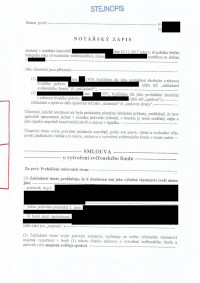A lot of people ask us what the correct price is for a trust.
Trusts are still quite new to the Czech Republic. At the beginning, back in 2014 and 2015, there was a lot of confusion as to what was the ‘right’ price for a trust. Some people considered that a trust was a bit like a company and using the cost of establishing a company as a guide, they were charging in the range of 20-30,000 CZK.
Since then, the market has matured, and people have realised that setting up a trust correctly is more complicated than a company. Many companies are ‘standard’, most trusts are not.
We have heard of people charging hundreds of thousands for a trust. Our company normally charges around 50,000 CZK for a relatively non-complicated trust. Some of our competitors charge more, up to 75,000 CZK, others a little less. On top of this cost, you need to factor in the cost of the notary (normally in the range of 5-10,000).
What do you get for your Money?
If our hourly charge out rate is 2,000 ZK per hour, then that would suggest we spend 25 hours working on the establishment of each trust . . .
But the truth is that in most cases we don’t spend this long.
So if you are not paying for our time, what then are you paying for?
You get what you pay for
Our company offers access to professionals who have collectively many many years of establishing trusts, both here and in other countries. Between us we have established thousands of trusts and we have met many different clients with many different situations and needs.
Because of this experience, we know how to build trusts correctly. We have also invested hundreds of hours developing our documents to ensure that the are strong, that they deal with unforeseen circumstances, and that they achieve the results that our clients want. Each of our clients benefits from this wealth of experience, which we think makes our services look pretty cheap. In most other countries in the world, you can expect to pay around 100-150,000 CZK to set up a trust
Some of our competitors offer similar levels of competence and experience. Many do not.
Of course, you can find someone cheaper
 We have linked here to a trust statute from the public register of trusts. This is one of many examples of ‘not so great’ trusts, often the result of someone trying to save money.
We have linked here to a trust statute from the public register of trusts. This is one of many examples of ‘not so great’ trusts, often the result of someone trying to save money.
You may ask us how we can show you someone’s trust document. That’s because whoever established this trust omitted to inform the court that the document should not be published (Mistake number 1).
Because we very much doubt that the clients involved actually wanted their private affairs to be public, we have redacted their names and other identifying details. If you are curious you can find this, and many other similar trusts open to public view on the register of trusts
Ignoring the notarial preamble, this document has two pages of actual content. In our experience, it is impossible to make a robust trust with less than 10 pages, and our documents typically run to about 30-40 pages. This one is much too short (Mistake number 2). If your trust is less than 10 pages long, we recommend you seek help immediately.
The beneficiary of this trust is also the only trustee. That is directly in conflict with the provisions of the Civil Code which require there should be at least one independent trustee in such a case. That means that this trust probably isn’t valid at all (Mistake number 3)
Another problem stemming from this is that the Civil Code says that a trustee cannot make a decision to benefit himself. That means that even if this trust is valid – which we doubt – there is no way to make any payment to the beneficiary (Mistake 4)
When the founder signed this document, he put all the assets in at the beginning meaning that he paid a lot more in notarial fees than was necessary (Mistake 5). There is no reason to do this. In addition to saving a lot of money, it normally makes much more sense to set up the trust first and then put the assets in later. We suspect that this trust may have been done directly by the notary without any legal or expert input. The notary probably did quite well financially from this, but not the client.
This trust has just one beneficiary. What happens if he dies? If his Father (The Founder) is still alive it will go back to him, but if not, then the assets will go to the Czech State. Probably not what the client wanted! (Mistake 6)
There is no mechanism for replacement of the trustee. So what happens if the Trustee dies or retires? If the Founder is no longer alive they’ll have to go to court to solve that one and end up spending a lot more money than they ‘saved’ (Mistake 7)
Beyond that, there are many many things missing that should be here. Exactly what else is missing is difficult to guess without understanding the client’s objective when he set up the Trust.
If the reason for setting up this trust was, or included, protection of the assets against external attack, we doubt very much if this will be effective. There is only one beneficiary who is also the only trustee. This means that in effect, the assets are ‘his’ and are therefore very vulnerable to attack, plus in any case, as discussed above, this probably isn’t a valid trust anyway.
We have no idea how much these people paid for their trust. We hope not much. Even if they paid a very small amount it wasn’t good value for money!
The Moral
Don’t accept the cheapest offer. Cheap, as we have demonstrated, is not always better! Sometimes its worth spending a bit more to get something done professionally.
Also, if someone gives you less than 10 pages to sign, run away quickly!

